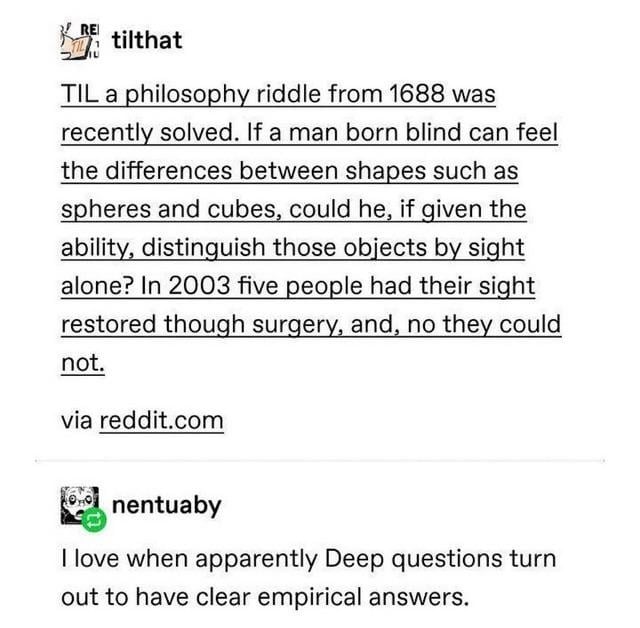this post was submitted on 21 Oct 2023
1046 points (98.5% liked)
Microblog Memes
10964 readers
2742 users here now
A place to share screenshots of Microblog posts, whether from Mastodon, tumblr, ~~Twitter~~ X, KBin, Threads or elsewhere.
Created as an evolution of White People Twitter and other tweet-capture subreddits.
RULES:
- Your post must be a screen capture of a microblog-type post that includes the UI of the site it came from, preferably also including the avatar and username of the original poster. Including relevant comments made to the original post is encouraged.
- Your post, included comments, or your title/comment should include some kind of commentary or remark on the subject of the screen capture. Your title must include at least one word relevant to your post.
- You are encouraged to provide a link back to the source of your screen capture in the body of your post.
- Current politics and news are allowed, but discouraged. There MUST be some kind of human commentary/reaction included (either by the original poster or you). Just news articles or headlines will be deleted.
- Doctored posts/images and AI are allowed, but discouraged. You MUST indicate this in your post (even if you didn't originally know). If an image is found to be fabricated or edited in any way and it is not properly labeled, it will be deleted.
- Absolutely no NSFL content.
- Be nice. Don't take anything personally. Take political debates to the appropriate communities. Take personal disagreements & arguments to private messages.
- No advertising, brand promotion, or guerrilla marketing.
RELATED COMMUNITIES:
founded 2 years ago
MODERATORS
you are viewing a single comment's thread
view the rest of the comments
view the rest of the comments

Sight is a combination of raw data input and interpretation of that data. It turns out that if you miss a critical window of learning early in life, you are almost certain to never learn how to interperet that data correctly even if you gain the ability to see. Many people who have gained sight after being blind from birth find it simply overwhelming and regret the medical intervention. Richard L. Gregory's "Eye and Brain: The Psychology of Seeing" is a fascinating read on this topic. Even those with sight fail to interpretet things properly depending on their experience - for example, someone who lived in a dense forest all their life (where they never had the opportunity to see anything from a distance), is likely to think that the elephants are the size of ants if they are viewed from afar. A lot of brainpower goes into learning how to see in early life, and if you miss that, it's over.
I wonder if this would extend to any attempt to augment human sight. Like, if we could implant new cells in someone's eyes, identical in function to the ones that let them see colors, but these new cells detect, say, ultraviolet, would their brain be able to figure out what to do with the data?
Tweaking existing senses does work, but there's limits. There's people experimenting with stuff like implanting magnets in their fingers
Interesting question!